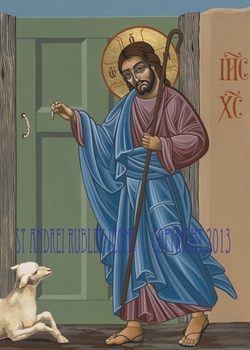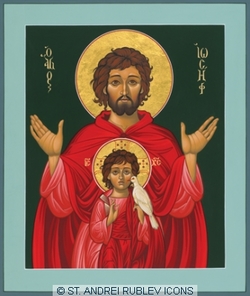 This is the time of year in which we begin to gear up for many types of celebrations and transitions. Quite often our calendars for May and June are chock-full of events which we need to attend in order to celebrate the end of one thing and the beginning of the next. High school graduations are looming and therefore not long after, sons and daughters are going to leave for college. Others might be graduating college or finishing education at whatever level was desired, ready to take on life in a brand new way. For some families soon it may be time to move to another city for a new job opportunity. There are also those for whom it is time to begin a life together through marriage. And again for others it is the time of ordination and the beginning of a new type of ministry. Indeed the months ahead are those in which transitions seem to be all around us. It is interesting, therefore, to realize that in celebrating the season of Easter what we are rejoicing over is the transition of Jesus from life through death and resurrection to new life as Risen Lord. Easter is a time of transition for everyone as we went from Lenten renewal to new life in the joy of Easter. It was also a time of transition for many people into full communion with the church through baptism and confirmation. Throughout the season we are reminded in the Scriptures of the transition of the apostles from a rag-tag group into the leadership of the Christian church. We hear the details of how the men and women who followed Jesus were transformed through His death and resurrection into their true selves, empowered by baptism with water and the Spirit. Most notable are the stories of Peter, who became the leader in Jesus’ place, and Paul, who went from being literally dead-set against the new church to becoming one of its greatest champions. Each one of them was changed through their encounter with Jesus (and by the Holy Spirit) into the person they were always meant to be, loved by God and lovers of God. And each one became a light to those around them, sharing the faith and helping the Church to grow.  If we really stop and reflect upon the process of transformation that takes place through change, especially those which require leaving one way of life for another, we see that it often involves some pain and suffering. Students are often very excited to get out of high school, yet simultaneously they are a bit frightened, even terrified, of the new beginning. There is a push/pull that goes on within them, and within their parents, as they are looking forward to the change and are frightened of it simultaneously. This is true of any kind of change we go through, especially difficult if it involves sickness and death, or a burden we must bear in caring for a loved one. When a spouse passes away, one does not know how he or she will go on because life is changed forever. It was changed forever when they married, but at that point they had a future together to look forward to, and so it was joyous even in the face of the unknown. With a death, there is a void and we do not know how to envision the future. It was no different for the apostles. When Jesus died their world was shattered. They bore the guilt and shame of their behavior during that time as well as their disappointment that He was gone. But when stories of Jesus’ resurrection came to their attention, when Peter and John saw the empty tomb, hope began to take hold. When Jesus walked into the locked Upper Room and said “Peace be with you,” it was not their understanding that kicked in, but rather it was belief. They still were mystified about what had happened, but everything began to come into perspective. Life would never be the same, but there was joy, hope, peace, faith, and new life in every way imaginable. However, this did not mean 'they had arrived' and that all challenges were over. On the contrary, it meant that there would be new responsibilities and new challenges, some of which would lead to suffering and death. But now they had a new focus which led to the unfolding of a new understanding. And this focus empowered them to go forth into the unknown because they knew that Jesus was with them no matter what took place. They had nothing to fear in His presence. They knew the fullness of His mercy and compassion concerning their failures; they knew forgiveness and therefore they could offer it to those who challenged them, along with the mercy and compassion which they had received. They were different because they, too, had passed through suffering, and they embraced the love of Jesus offered to them throughout the entire process.  In the gospel for this week Jesus said to His followers that He is the good shepherd and that the good shepherd knows His sheep. He told them that a good shepherd never leaves His sheep and is willing to die for them. What He said that is most fascinating, however, is that there are other sheep in His flock. He said, “I have other sheep who do not belong to this fold. These also I must lead and they will hear my voice, and there will be one flock, one shepherd.” (John 10:16) Jesus wants to lead all His people, even those who are not in sync with the fold, so to speak. He loves us all, including the ones who do not know Him and those who seek to do Him harm. Therefore he needed the apostles to continue His work. They were to reach out to those not in the fold and help them to know of Jesus and His love for them. They were to minister to everyone and they were to do this in the company of the Lord, never alone. This week we also celebrate St. Joseph the Worker. This feast not only honors St. Joseph, but it teaches us to do the work of bringing the Kingdom of God to those ‘other sheep’ through our actions and our relationships. Being a friend takes a lot of work. Our friends (and we) are no different than the friends of Jesus: we will share good times and we will try to help each other when in need. Overall we will mean well, but we will ‘mess up’ from time to time; therefore it will require forgiveness, compassion, and mercy. In our work we may be challenged by difficult managers, the jealousy of co-workers, and the toil of the job. But in all we are disciples of Jesus: we bring Him into every encounter, which may include those ‘not belonging to the fold’ quite yet. If we want them to belong to the fold, we need to gently love them into it through our behaviors.  These two thoughts, that transition is part of life and that we need to do the work of sharing the Kingdom, tie together in this one gospel passage. Our relationships, our work, and all our dealings with people in general are part of the work of following the Good Shepherd who is with us always. In order to do His work, we must endure change. This not only helps us to grow, and therefore it strengthens us - (most especially when we feel weakest because then we can do nothing except rely on God) - but it empowers us to deeper compassion, mercy, and love than we ever thought we were capable of having. Transitions are necessary in the same way that Jesus explained when He said the grain of wheat had to die in order to sprout into new life. If not for the breaking open of the seed kernel, the plant would not come forth and it would die a death that is final and without hope. But if the kernel endures the pain of transition, it then dies to its old form and rises in its new, more beautiful form and becomes the one it was always meant to be. So while some transitions are more difficult than others, all are necessary even if they seem to make no sense or that they are almost more than we can endure. The important thing is that we remember we are never alone, and that Jesus is not only empowering us, but He is giving us what we need to continue to grow even more beautiful than we already are. We cannot get through life without transitions, and thank God for that, because without transition there would be no life with God forever.  May we seek Jesus in whatever change we are experiencing! May we hold fast to our baptismal faith, hope, and love when we feel most challenged, trusting in Jesus our Good Shepherd! May we help each other as we go through transition! May we accept the work which is given us, knowing that no matter what it is that we do, it is in order to build the Kingdom! And may we realize that our Good Shepherd knows us intimately, is with us always, and loves us beyond anything we could imagine! Let us continue to meet in the Heart of Jesus! Alleluia! Peace! ©Michele L. Catanese The photos are all my own: the first was taken in Long Island, New York in late Spring. The butterfly was taken at my home. Butterflies can be seen as symbols of change since they have a very colorful and distinctive life cycle complete with dramatic change from caterpillar to chrysalis and cocoon, to butterfly. The photo at the end is of a wildflower coming up from a rocky surface in Big Bend National Park, TX. Life comes forth from the (seemingly) lifeless. The icons are the work of Fr. William Hart McNichols. The first is El Buen Pastor (The Good Shepherd) which can be found at http://www.fatherbill.org/all-categories/product/37-el-buen-pastor The second is St. Joseph Shadow of the Father which can be found at http://fineartamerica.com/featured/st-joseph-shadow-of-the-father-william-hart-mcnichols.html Comments are closed.
|
Heart Speaks to Heart
|

 RSS Feed
RSS Feed

